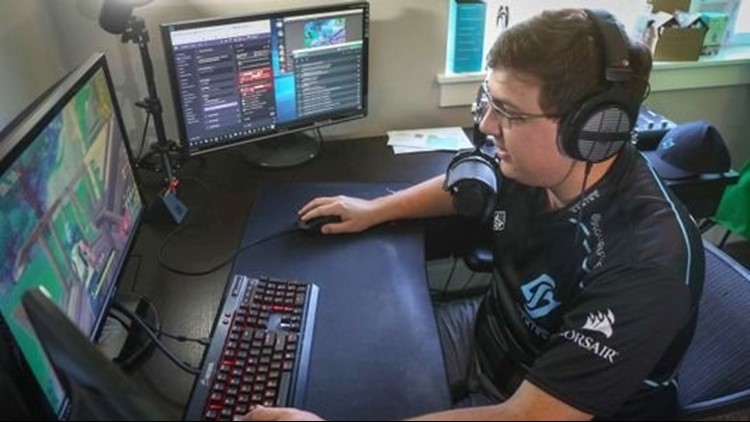"What do you do for a living?" a man asked Nick Overton at a bar.
Overton looked through his rectangular-framed wire glasses and answered that he plays video games.
The other man laughed.
"So, you live in your mom's basement?" he joked.
Little did this buzzed stranger know that the 27-year-old man in front of him did not live in his mother's basement, perhaps the oldest, outdated stereotype about gamers.
And he definitely didn't know that he was speaking with an online celebrity of sorts who sometimes gets stopped for autographs and selfies at the local Target.
With an annual income of up to $500,000, the popular YouTuber, Twitch streamer and professional video game competitor is living the career teens are dreaming of across the globe. And he's doing it from the comfort of his home.
The online celebrity has been stopped by pre-teens at local stores in town. Some have even gone so far to stalk him at his home.
But the humble man from Des Moines, Iowa, with a boyish grin and a deep voice made for broadcast still drives the same car he did in high school. And he hates being called a celebrity, citing the thousands of YouTube creators who have more subscribers than he does.
He's aware of how quickly everything can fall apart.
Because it took nearly his lifetime to make it all happen.
A lifelong love of gaming
At 12 years old, Overton was face to face with a child’s nightmare: His dad had just sold his Xbox and its accompanying games.
Since he was 4, Overton had a fascination with video games. His father worked in technology, so gadgets and electronics were nothing new to his family.
When he was 6, he got a Nintendo 64 for Christmas, an exuberant moment captured on a camcorder. He, his siblings and even his father were absorbed in the worlds of "Super Mario 64," "Super Smash Bros.," "Star Fox" and "Pokemon Stadium."
So, you can imagine Overton's fury when he returned home from school to learn his Xbox was gone.
“My parents did not like me playing back then. They thought I played too much, didn’t focus on school enough,” Overton said. “I freaked out. I was so mad at him.”
At 14, Overton got a part-time job at a grocery store, saving enough money to get an Xbox 360 — the second generation of Microsoft’s game console. When he brought it home, his dad was furious, but Overton pointed out: He purchased it with his own money.
“The best advice he gave me is, if you’re going to do this, you need to find a way to make money from it,” Overton said.
For Overton, gaming wasn’t just casual.
When he lost online, he would study the outcome and practice the skills he lacked.
Between the first two "Halo" first-person shooter games, he put in at least the equivalent of 250 days of game play.
Becoming a streamer and YouTube star
Before going to the University of Iowa, Overton spent time working for Justin.tv, now known as the Amazon-owned live-streaming service, Twitch. He helped the company decide who should become "partners," broadcasters that could make advertising revenue off their streams.
After graduating in 2013, Overton became the chief operating officer for a streaming company, Streamup.
On his own, he streamed his "Call of Duty" gameplay and uploaded videos to his YouTube channel, ImMarksman.
Though having a steady job seemed sensible, what he really wanted to do was focus on content creation.
When his yearlong contract was up with Streamup, he decide to take the controller into his own hands.
“I made more money streaming and doing YouTube than working for them, no question," Overton said. "I don’t have to answer to anyone but myself, and it was a lot nicer and more appealing to me.”
The everyday life of a professional gamer and streamer
The alarm buzzes at 3 a.m.
That means it’s time to make a video.
Once a week, when "Fortnite" releases a patch, Overton wakes up while everyone else sleeps and makes a video detailing the software updates to the game.
It’s a necessity, he said. Even though he goes to sleep at midnight.
“It helps get my channel name out there more,” Overton said.
When it’s not a patch day, Overton wakes up around 9 a.m. and immediately starts by talking to his teammates and answering emails. He was recently hired by Counter Logic Gaming, an eSports organization, to play "Fortnite."
The new gig comes with a salary, a 401(k) and medical benefits. There are practices, during which he plays "Fortnite" with other professional players.
He works on his video around noon and will have it finished by 3.
The video goes live at 7 p.m. and he streams on Twitch between 5 to 10 p.m.
He streams and chats with his viewers through a microphone every day. A webcam shows his face alongside the game he's playing, complete with animated expressions and rage when he gets killed in a game.
How to make a profit, and why most gamers don't
Over the summer, Overton and a partner playing in a tournament known as the Summer Skirmish won $12,500 each for placing fourth.
Right now, he's competing in the Fortnite Fall Skirmish tournament, with $10 million in prize money up for grabs over the six-week event.
Through "Fortnite" tournaments, he’s won $35,000 so far. Combine that with his salary he gets from his team, his monetized YouTube account and his Twitch stream? He makes between $300,000 to $500,000 a year.
That number fluctuates higher and lower though because of tournament winnings. And with something as finicky as YouTube and staying relevant, he estimates he invests about 80 percent of his income.
Overton has over 930,000 YouTube subscribers and over 3.5 million views of his Twitch stream.
But the vast majority of streamers or YouTubers will never reach the profit level that Overton sees.
He is in the top tier of streamers. Those who are less successful might try to sustain the work by selling T-shirts or creating a Patreon, where viewers can make donations to them. The majority also have full-time jobs outside of their streams.
The hype is there. The celebrity is there. The money is there.
But with the long hours and intense perserverance it takes to get into esports and streaming, there's no way anyone can do it unless they love it, said Overton.
"I never thought I was going to make money from this," Overton said. "I literally only did it because I liked to do it."



